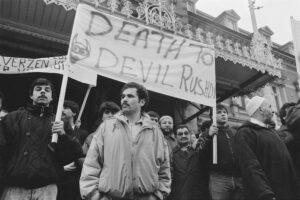From peace now to peace how
By Khaled Diab
As John Kerry's efforts appear doomed, Palestinian and Israeli peace activists are left with an impossible challenge: peace how? Ask the people.
Wednesday 29 January 2014
In a speech to the World Economic Forum in Davos, US secretary of state John Kerry sounded a doubtful note on the “intractable” Israeli-Palestinian conflict, but emphasised that the US is committed to finding a solution. Kerry's determination seems to reflect his conviction that Israel can be brought to make peace with the Arab world.
Earlier this month, Kerry commended Palestinian president Mahmoud Abbas for having “demonstrated courageous and determined leadership”. But in the real world, Palestinian negotiators are in open mutiny against Abbas, settlement building is continuing apace and senior Israeli officials are urging the government to reject any proposals put forward by the “messianic” Kerry, as Israeli Defence Minister Moshe Yaalon described him.
And to me it is unclear just how Kerry intends to breathe life back into the failed Oslo framework, especially as the race against space for the two-state solution was lost many years ago and Washington shows no signs of bringing anything new or imaginative to the table.
This has left peace activists contemplating peace how more than peace now. “Despite all Kerry's efforts, I am not optimistic at all,” confesses Nancy Sadiq, the director of Panorama, a Palestinian pro-democracy and peace NGO in Ramallah. “I guess Netanyahu and Abbas are playing a game of political poker and they're waiting to see who will blink first.”
“And Kerry has no Plan B,” she added for emphasis.
Sadiq co-organised the recent annual conference – which took place in Beit Sahour near Bethlehem – of the Palestinian-Israeli Peace NGO Forum, an umbrella group of around 100 pro-peace organisations, where the mood struck me as being similarly dour.
Gathered at the forum were Palestinians and Israelis from all walks of life and backgrounds – from secular types whose national background could not be determined easily to Muslim men in beards and women in headscarves, as well as Jewish men in kippas and women in wigs or colourful headscarves. There was even a man with a Moshe Dayan-style eye-patch.
This reflects the fact that, despite growing mutual hostility and rejection, not to mention the huge contraction of the active peace camp, a broad cross-section of both societies still mobilises for peace. “Peace is too dear to be left to politicians,” as one speaker put it.
Though the conference met under the banner of a “Palestinian state now”, one major overriding focus was to plan a course of action in the likely event that negotiations broke down.
“We are the peace police. We are the peace firefighters,” emphasised Yossi Beilin, the co-architect of the embattled and defunct Oslo process and the grassroots Geneva peace initiative, the sabotaging of which, the late Ariel Sharon admitted, was part of the motivation behind his Gaza disengagement, which many leftist Israelis disastrously supported.
And preparing for a breakdown, rather than a breakthrough, seemed to be the order of the day. “There is a fear that talks will fail which will make the work of peace NGOs very difficult,” one Palestinian participant said, echoing the general sentiment.
Some participants suggested that both societies needed to focus on laying the psychological groundwork for resolution through promoting peace education and a deeper commitment to mutual non-violence.
“I wish that there was room for grassroots activities for peace, separate and joint, but it seems that the time is not yet ripe for that,” veteran Israeli peace activist Gershon Baskin told me. “While a majority of Israelis and Palestinians want peace, a majority on both sides, roughly the same size, does not believe that it is possible… because each believes that there is no partner for peace on the other side.”
Personally, I think the problem runs much deeper and relates to the political infantilisation of the public. Efforts to bring about a resolution to the conflict have largely been top-down and from the outside-in, side-lining the actual parties who will have to implement and live with any agreement – the people themselves.
In addition, the two populations have been kept artificially apart, creating fear and distrust, while no leaders of the stature of the late Nelson Mandela or FW de Klerk have emerged. These factors create ideal conditions for extremists to have their way and to reinforce the downwardly spiralling status quo.
For that reason, I do not share Baskin's optimism that Kerry can bring about a framework agreement, and if he does, it will likely fall apart under the combined fire of extremists, fear and hatred.
In my view, the only sustainable way forward is to launch a true people's peace process in which a bi-national conversation and negotiations involving all segments of both societies is launched to bring all the issues out clearly in the open.
In addition, anyone should be free to suggest actions and any proposals which garner enough support should be voted on by the Israeli and Palestinian publics. Any measure which the majority on both sides vote for should be implemented immediately. This will help build traction and a virtuous circle of gradual change, rather than the all-or-nothing game currently in play.
“You know what I would like to see?” Nancy Sadiq asks. “The grassroots on both sides gathering in their masses until the white smoke of peace rises from the chimney of conflict.”
—
Follow Khaled Diab on Twitter.
This article first appeared in The National on 26 January 2014.



I agree that peace will only come from the “bottom,” from the grassroots as well as from the “meso” level – all the NGOs, and small groups that are working to make a difference. Having said that, it’s very hard to remain optimistic in the face of the “top down” narrow-minded, short-term oriented, politically-motivated resistance.
good luck with that… i’ve pretty given up on seeing it happen in my lifetime.